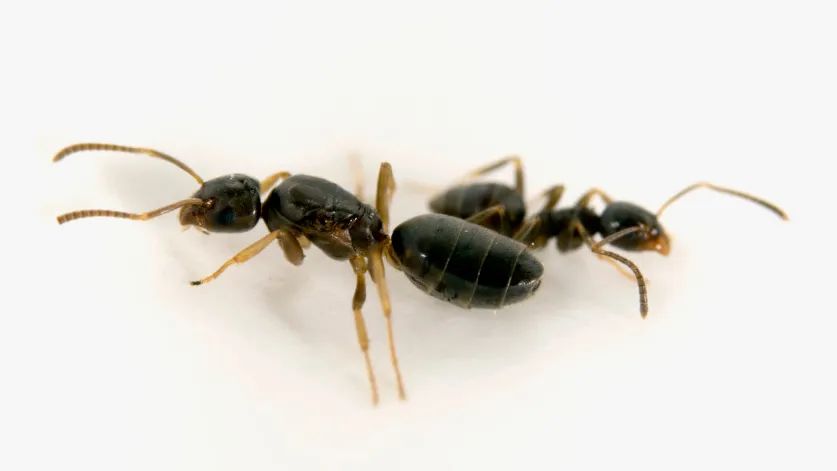Ants are ubiquitous insects that can be found almost everywhere on Earth. Though most ant species are harmless, there are some types of ants that emit a foul odor when crushed or disturbed. This article will explore what types of ants give off a particularly bad smell and why they produce these odors.
Page Contents
Why Do Some Ants Smell Worse Than Others When Crushed?
All ants produce alarm pheromones to alert nestmates when they are injured or killed. However, certain species secrete stronger smelling and longer lasting chemicals for defense. The main factors that contribute to an ant smelling worse when crushed include:
- Chemical composition of their alarm pheromones
- Size of their venom sac
- Presence of other defensive chemicals
Some ants invest more energy into producing potent chemicals to ward off predators. For example, bull ants and jack jumper ants have large venom sacs that explode upon compression, releasing alarm pheromones with a piercing, acidic odor. Other ants augment their pheromones with additional smelly chemicals like alkanes or terpenes that have a strong, lingering odor.
The Smelliest Ant Species
Here are some of the worst smelling ants when crushed or aggravated:
Bull Ants
Bull ants (Myrmecia species) are large, aggressive ants native to Australia. Their powerful stingers can inject a painful toxin deep into skin. When crushed, bull ants release a potent, mustard-like smell from their large venom sac.
Jack Jumper Ants
Jack jumper ants (Myrmecia pilosula) are also known as hopper ants and jumper ants. Like bull ants, these Australian ants have a very painful sting and get their name from their tendency to jump when disturbed. The insides of jack jumper ants smell strongly of acetophenone when smeared.
Carpenter Ants
Carpenter ants (Camponotus species) have a pungent odor that smells like rotting coconuts when crushed. They produce this smell from chemicals called alkanes that are released when the ants are stressed or killed.
Odorous House Ants
As their name implies, odorous house ants (Tapinoma sessile) give off a rotten, fishy smell when smashed. This odor comes from their alarm pheromone, which contains several volatile chemicals like 2-heptanone.
Pavement Ants
Pavement ants (Tetramorium caespitum) are extremely common in urban areas. Though small, they produce one of the worst smells of any ant when disturbed. Their glands produce an alarm pheromone with a strong, penetrating odor reminiscent of blue cheese.
Pharaoh Ants
Pharaoh ants (Monomorium pharaonis) are a small but mighty smelling species. When agitated, these tiny ants release an alarm pheromone that contains several compounds, creating an intensely skunk-like smell.
Acrobat Ants
Acrobat ants (Crematogaster species) have heart-shaped abdomens that they tuck under their bodies. Though they do not sting, these ants can spray formic acid from their abdomens when threatened, giving off a vinegary smell.
Fire Ants
Fire ants (Solenopsis species) have a famously painful sting that gives them their name. Compounds in their venom produce a strong, sour odor that some describe as smelling like batteries when they are crushed.
Why Do Ants Produce Smelly Chemicals When Disturbed?
Ants have evolved to release odorous chemicals when injured for several key reasons:
- Alarm signal – To alert nearby worker ants that a threat is near the nest or a trail.
- Predator deterrent – The foul smells warn predators to avoid the ant to prevent getting stung/sprayed.
- Recruit nestmates – The pheromones call more ants from the colony to defend against the threat.
- Toxicity – Some chemicals are poisonous to small predators like spiders and other insects.
Additionally, the long-lasting odors of crushed ants mark the site where they were killed. This lingering smell can warn other ants to avoid the area long after the initial ant is gone.
Conclusion
Ants like bull ants, jack jumper ants, carpenter ants, and fire ants produce some of the worst smells when aggravated or crushed. Their glands and venom sacs contain concentrated, odiferous alarm pheromones and defensive chemicals that are released as a defense mechanism. Though foul-smelling, these noxious ant odors serve an important purpose – to protect the ant colony against predators and other threats. So while we may find their smells unpleasant, for the ants it’s just another day’s work of guarding their colonies with their smelly arsenal of chemicals.
